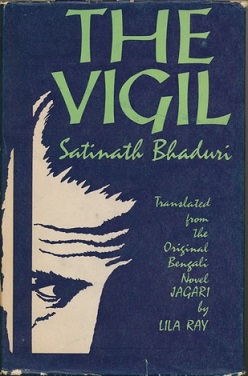Anita Desai, born Anita Mazumdar is an Indian novelist and the Emerita John E. Burchard Professor of Humanities at the Massachusetts Institute of Technology. As a writer she has been shortlisted for the Booker Prize three times. She received a Sahitya Akademi Award in 1978 for her novel Fire on the Mountain, from the Sahitya Akademi, India's National Academy of Letters. She won the British Guardian Prize for The Village by the Sea. The Peacock, Voices in the City, Fire on the Mountain and an anthology of short stories, Games at Twilight. She is on the advisory board of the Lalit Kala Akademi and a Fellow of the Royal Society of Literature, London.

Talukina Ramaswamayya Subba Rao (1920–1984), popularly known as TaRaSu, was an Indian novelist and a scholar in the Kannada-language. He is considered as a harbinger of the Navya movement of Kannada literature. He is well known for his novels like Durgashtamana, which won him the Sahitya Akademi award posthumously in 1985.
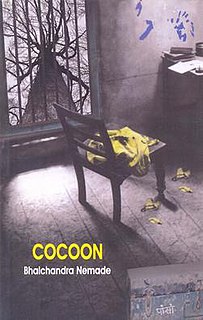
Kosala, sometimes spelled Kosla, is a Marathi novel by Indian writer Bhalchandra Nemade, published in 1963. Regarded as Nemade's magnum opus, and accepted as a modern classic of Marathi literature, the novel uses the autobiographical form to narrate the journey of a young man, Pandurang Sangvikar, and his friends through his college years.

Shankar, is a writer in the Bengali language and the Sheriff of Kolkata. He grew up in Howrah district of West Bengal.

Akshay Kumar Baral (1860–1919) was a Bengali poet and writer. He was born in Kolkata. The family originally hailed from Chandannagar, Hooghly District.
Sombhu Mitra was an Indian film and stage actor, director, playwright, reciter and an Indian theatre personality, known especially for his involvement in Bengali theatre, where he is considered a pioneer. He remained associated with the Indian People's Theatre Association (IPTA) for a few years before founding the Bohurupee theatre group in Kolkata in 1948. He is most noted for films like Dharti Ke Lal (1946), Jagte Raho (1956), and his production of Rakta Karabi based on Rabindranath Tagore's play in 1954 and Chand Baniker Pala, his most noted play as a playwright.
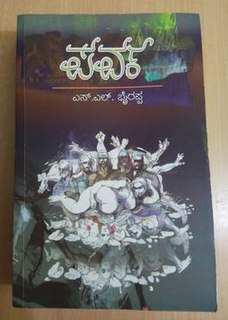
Parva is a novel written by S. L. Bhyrappa in the Kannada language. It is a retelling of the Sanskrit epic Mahabharata, narrated through the personal reflections of the principal characters. The novel is widely acclaimed as a modern classic. Parva is among Bhyrappa's most widely debated and popular works and is considered by many to be his greatest.
Satinath Bhaduri was a Bengali Indian novelist and politician. He was known by his literary pseudonym, Chitra Gupta.

Santosh Kumar Ghosh was an Indian Bengali litterateur and a journalist of repute.
Kato Ajanare is a Bengali novel written by Mani Shankar Mukherjee. This was Shankar's first novel which mainly deals with author's memories of Mr. Barwell, a renowned Barrister of the Calcutta High Court.

Nalini Bala Devi was an Indian writer and poet of Assamese literature, known for nationalistic as well as mystical poetry. She was awarded the Padma Shri by the Government of India in 1957 for her contribution to literature, and 1968 she won the Sahitya Akademi Award given by Sahitya Akademi for her poetry collection Alakananda. She is the first woman Assamese poet to be awarded with Padma Shri and the first lady to the chair the Assam Sahitya Sabha.

Manubhai Pancholi also known by his pen name Darshak, was a Gujarati language novelist, author, educationist and politician from Gujarat, India. He participated in the Indian independence movement and held several offices after independence.

Jayanti Ghelabhai Dalal was an Indian author, publisher, stage actor, director and politician. Born in family of theatre organiser and involved in politics during and after independence of India, he was influenced by socialism and Gandhian philosophy. He wrote one-act plays, short stories and edited publications.
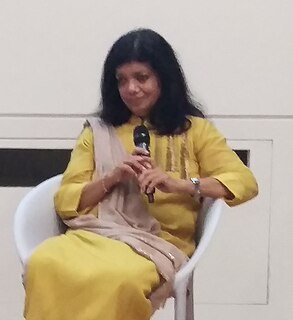
Alka Saraogi is an Indian novelist and short story writer in the Hindi language. She is a recipient of the 2001 Sahitya Akademi Award for Hindi for her novel Kalikatha: Via Bypass.
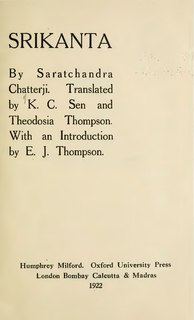
Srikanta, also spelled Srikanto, is a Bengali novel written by Sarat Chandra Chattopadhyay. Published in four parts between 1917 and 1933, It has been described as Sarat Chandra's 'masterpiece'. The novel takes its title after the name of its protagonist, Srikanta, who lives the life of a wanderer.
Kanhu Charan Mohanty was an Indian Odia language novelist who wrote fifty-six novels in a career spanning over six decades from 1930 to 1985. He is considered "one of the most popular and celebrated novelists of Odisa". Mohanty was awarded the Sahitya Akademi Award in 1958 for his novel, Kaa, published in 1956, and was one of the fellows of the Sahitya Akademi. Mohanty died on 6 April 1994 at the age of 87.

Pan Lakshat Kon Gheto is an 1890 Marathi-language novel by Hari Narayan Apte. Written in autobiographical style, the novel tells the story of Yamuna, a young Hindu middle-class woman, who dies after suffering the injustices of a society where child marriage is customary. It is considered to be a classic novel in Marathi literature.
R. Narayana Panickar was an Indian essayist, playwright, translator, lexicographer, novelist and historian of Malayalam. He was credited with over 100 books but the best known among them are the six-volume work, Kerala Bhasha Sahithya Charthram, a comprehensive history of Malayalam literature up to 1954 and Navayuga Bhasha Nighantu, a lexicon. He also wrote a number of novels and translated several classics of Tamil literature including Purananuru, Akanaṉūṟu and Silappatikaram. Sahitya Akademi honoured him with their annual award in 1955.
Binod Chandra Nayak was an Odia writer. He was known for his writing that was influenced by modern poetry while being romantic. He was awarded the 1970 Kendra Sahitya Akademi award for his poetry collection Sarisrupa.
Langal was a Bengali leftist-literary magazine published from Kolkata in the early 20th century. It was edited by Kazi Nazrul Islam.
